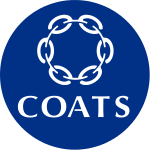Coats Group
 | |
| Public limited company | |
| Traded as |
LSE: COA ASX: CGW NZX: COA |
| Industry | Consumer and intermediate goods |
| Founded | 1755 |
| Headquarters | Uxbridge, Middlesex (UK) |
Key people |
Mike Clasper,[1] Chairman Paul Forman, CEO Simon Boddie, CFO |
| Products | Textile arts related |
| Revenue | US$1,489.5 million (2015)[2] |
| US$139.4 million (2015)[2] | |
| US$(39.4) million (2015)[2] | |
| Website |
www |
Coats Group plc is a British multi-national company. It is the world's largest manufacturer and distributor of sewing thread and supplies, and the second-largest manufacturer of zips and fasteners, after YKK.
History

In 1755 James and Patrick Clark began a loom equipment and silk thread business in Paisley, Scotland.[3] In 1806 Patrick Clark invented a way of twisting cotton threads together to substitute for silk threads which were unavailable due to France's blockade of Great Britain and opened the first plant for manufacturing the cotton thread in 1812.[4] In 1864 the Clark family began manufacturing in Newark, New Jersey, U.S. as the Clark Thread Co.[3]
In 1802 James Coats set up a weaving business, also in Paisley. In 1826 he opened a cotton mill at Ferguslie to produce his own thread[5] and, when he retired in 1830, his sons, James & Peter, took up the business under the name of J. & P. Coats.[4] The firm expanded internationally, particularly to the USA. In 1890 Coats listed on the London Stock Exchange,[3] with a capital base of £5.7M.[5]
In 1952 J. & P. Coats and the Clark Thread Co. merged.[4] In 1961 a merger with Patons and Baldwins created Coats Patons.[3] In 1986 a merger with Vantona Viyella created Coats Viyella.[3] In 2003 Guinness Peat took Coats private and in 2015 it returned to the market as 'Coats Group'.[3]
Controversy
In 2007 Coats was fined €110 million by the European Commission for participation in cartels with Prym, YKK and other companies to fix and manipulate the prices of zips and other fasteners, and of the machinery to make them. One of the cartels ran for twenty-one years. An appeal in 2012 to the General Court of the European Union was dismissed, and the fine upheld.[6][7]
References
- ↑ "GPG names new non-executive chairman of Coats". NBR. 21 August 2013. Retrieved 24 January 2016.
- 1 2 3 "Annual Report for year ended 31 December 2015" (PDF). Coats. Retrieved 17 September 2016.
- 1 2 3 4 5 6 "History". Coats. Retrieved 24 January 2016.
- 1 2 3 "Heritage". Coats & Clark. Retrieved 24 January 2016.
- 1 2 "Records of Coats Viyella plc, thread manufacturers, Paisley, Renfrewshire, Scotland". Retrieved 2009-02-03.
- ↑ Aoife White (27 June 2012). Coats and YKK Lose EU Court Challenges Over Antitrust Fines. Bloomberg. Accessed March 2015.
- ↑ Judgment of the General Court (Third Chamber) of 27 June 2012. Coats Holdings Ltd v European Commission. Competition – Agreements, decisions and concerted practices – Markets for zip fasteners and ‘other fasteners’ – Decision finding an infringement of Article 81 EC – Coordinated price increases, fixing of minimum prices, customer-sharing, market-sharing and exchange of other commercial information – Evidence – Single and continuous infringement – Limitation period – Rights of the defence – Fines – Guidelines. Case T-439/07. Accessed March 2015.
Further reading
- Kim, Dong-Woon. "From a Family Partnership to a Corporate Company: J. & P. Coats, Thread Manufacturers," Textile History, Autumn 1994, Vol. 25 Issue 2, pp 185–225
- Kim, Dong-Woon. "The British multinational enterprise in the United States before 1914: The case of J. & P. Coats," Business History Review, Winter 1998, Vol. 72 Issue 4, pp 523–52
- Kim, Dong-Woon. "J. & P. Coats in Tsarist Russia, 1889–1917," Business History Review, Winter 1995, Vol. 69 Issue 4, pp 465–94
- Kininmonth, Kirsten W. "The growth, development and management of J. & P. Coats Ltd, c.1890–1960: An analysis of strategy and structure," Business History Oct2006, Vol. 48 Issue 4, pp 551–579
- Knox, William W. Hanging by a Thread: The Scottish Cotton Industry, c. 1850–1914 (1995),
- Financial Times 'Coats poised to return to LSE' by Mark Wembridge